...
The General Settings tab contains a single Main section.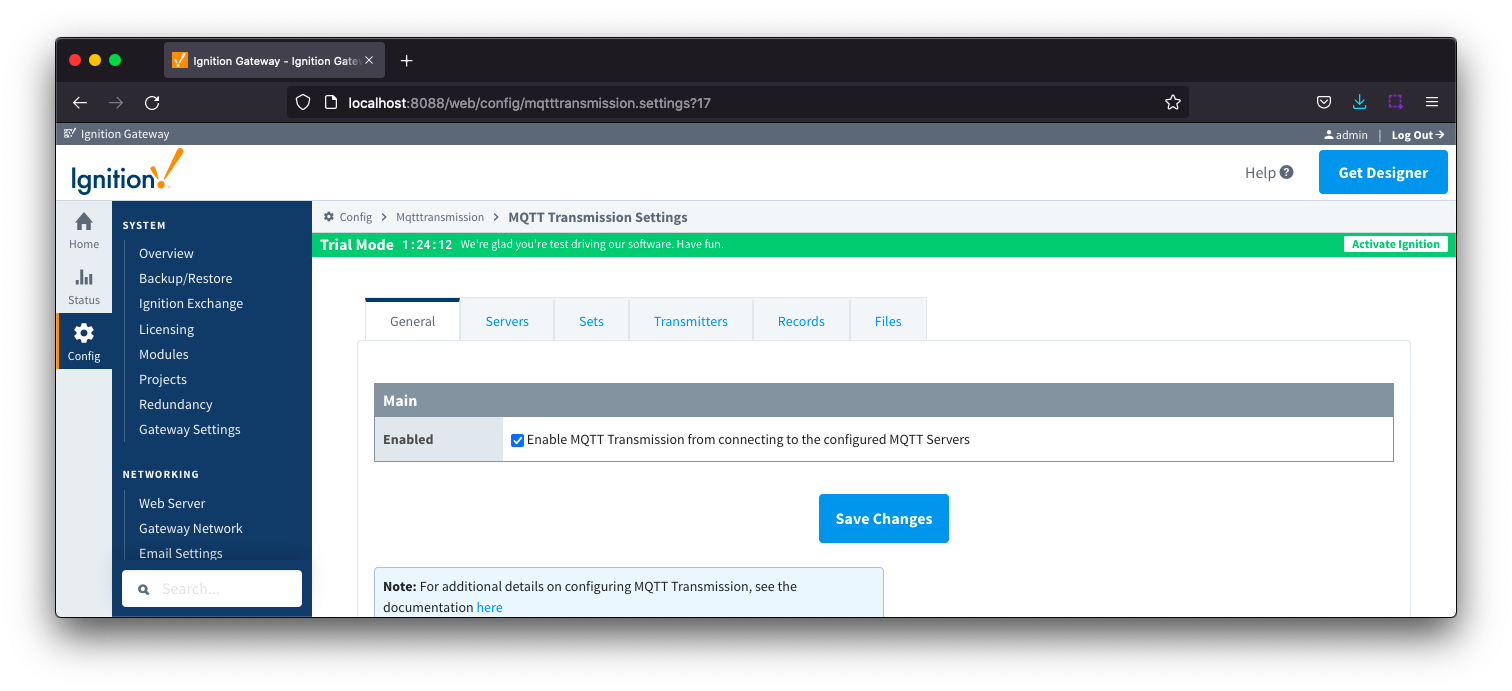
General - Main- Enabled
- Whether or not to enable or disable MQTT Transmission from connecting to the configured MQTT Servers.
...
The configuration sections available are Main, TLS, and Advanced.
| Anchor |
|---|
| ServerSettingsMain |
|---|
| ServerSettingsMain |
|---|
|
Server Settings - Main

- Name
- This is the friendly name of the MQTT Server used to easily identify it
- URL
- This is the URL of the MQTT server. Its format is as follows: [protocol]://[location]:[port]. Each of these are shown below
- protocol - Either tcp or ssl
- location - The server location. e.g. localhost, myserver.chariot.io, mydomain.com, etc
- port - The port the MQTT Server is listening on. Generally this is 1883 if using TCP or 8883 if using SSL
- Server Set
- The Set that this server is a member of.
- Username
- Optional MQTT username to use in the MQTT connect packet. This is required if the MQTT Server to connect to requires it.
Change Password?
- Check box to enable changing of the optional password
- Password
- Optional MQTT password to use in the MQTT connect packet. This is required if the MQTT Server to connect to requires it.
| Anchor |
|---|
| ServerSettingsTLS |
|---|
| ServerSettingsTLS |
|---|
|
Server Settings - TLS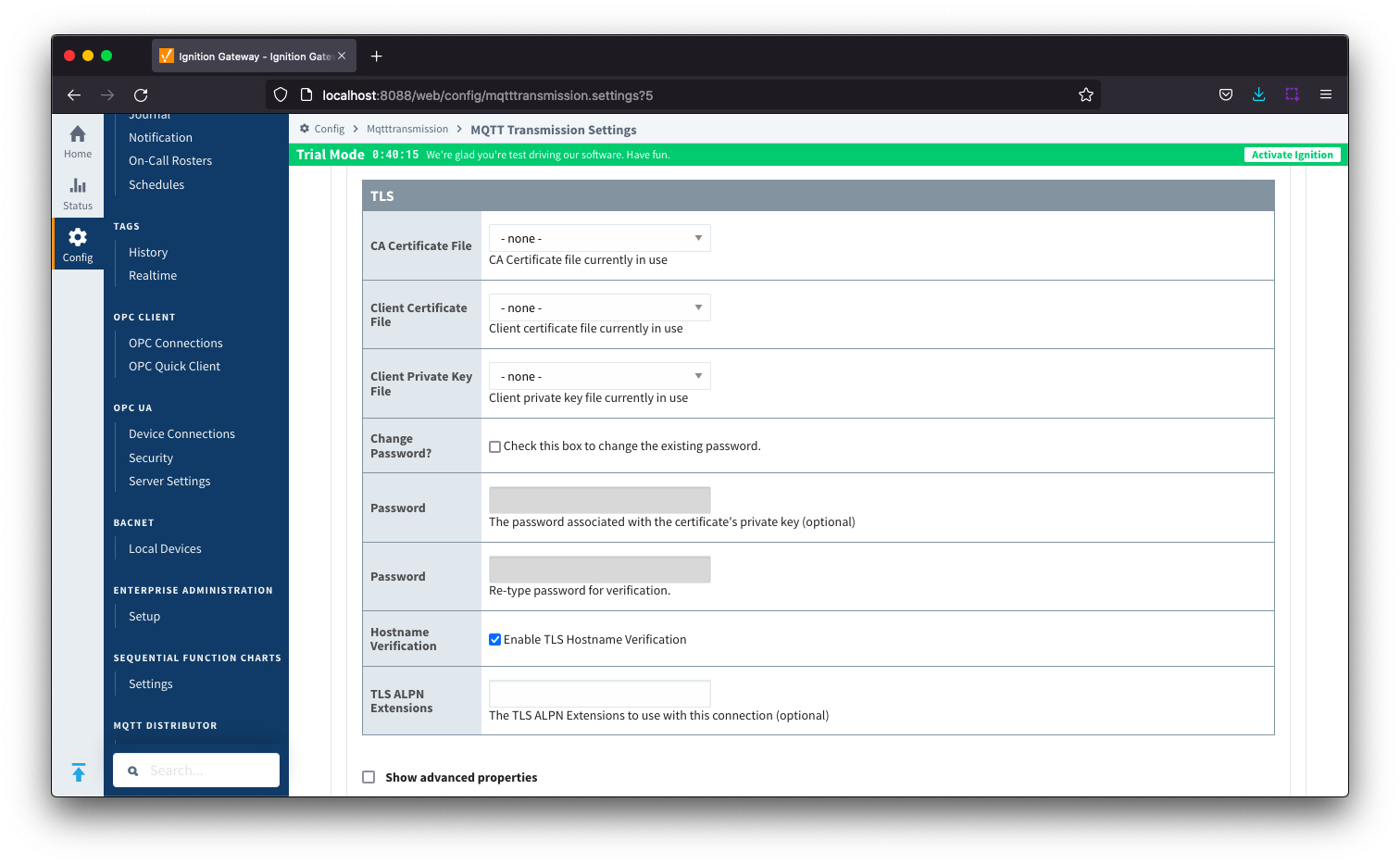 Image Modified
Image Modified
See this document for TLS configuration: Configuring Secure MQTT Communication
- CA Certification File
- CA Certification file currently in use.
- Client Certification File
- Client Certification file currently in use.
- Client Private Key File
- Client Private Key file currently in use
- Change Password?
- Check box to enable changing of the optional password.
- Password
- Optional password associated with the certificate's private key.
- Hostname Verification
- Enable TLS Hostname Verification. This is true by default.
- TLS ALPN Extensions
- Optional TLS ALPN Extensions to use with this connection
| Anchor |
|---|
| ServerSettingsAdvanced |
|---|
| ServerSettingsAdvanced |
|---|
|
Server Settings - Advanced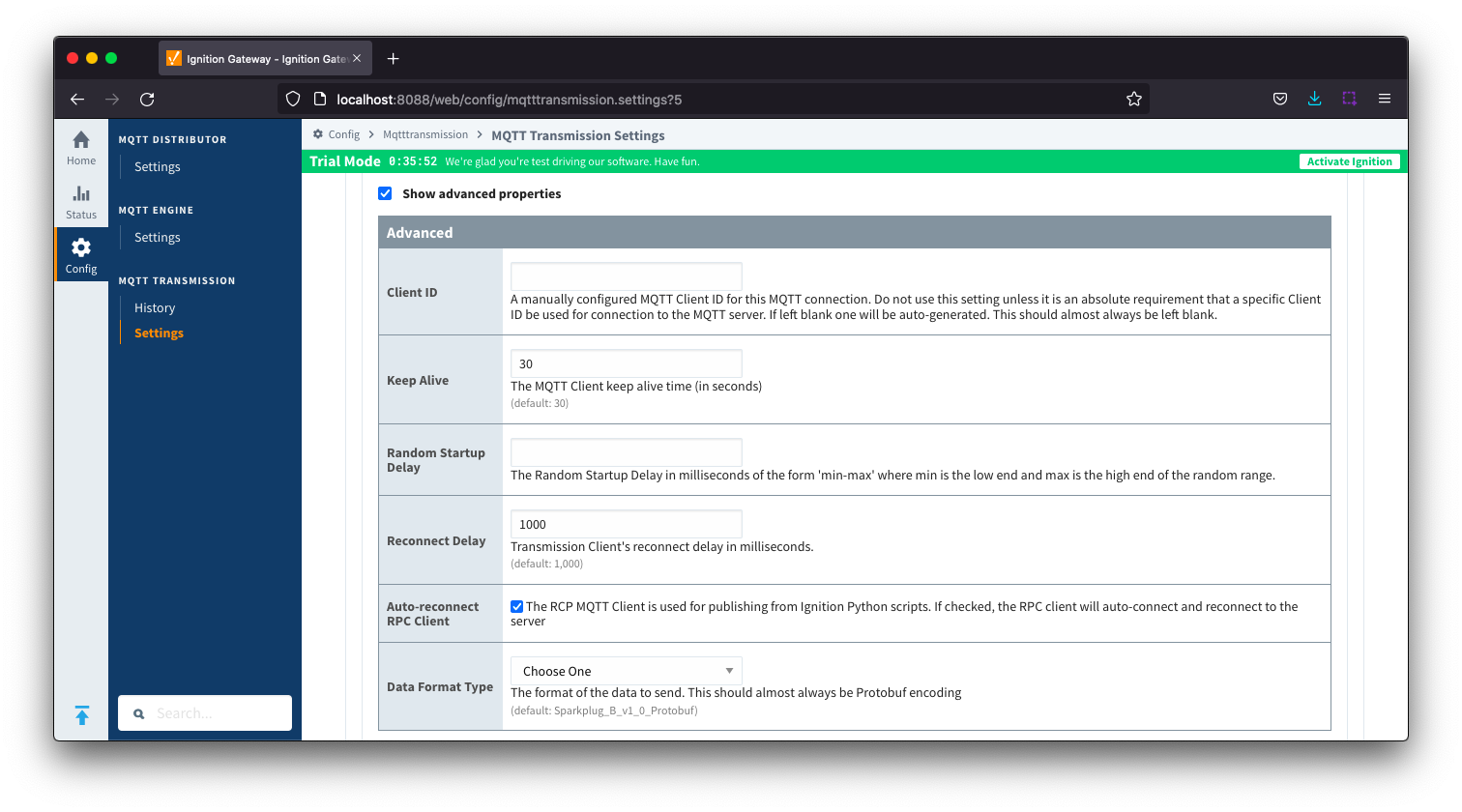 Image Modified
Image Modified
- Client ID
- Optional MQTT client ID to use. If specified this will be used in the MQTT Engine connect packet when connecting to the server. If left blank, a random client ID will be create of the form 'IgnitionTarget-xxxxxxxx-xxxx-xxxx'. Caution: MQTT Clients IDs must be unique and if two clients attempt to connect with the same client ID, one will be forcefully disconnected from the server to allow the other client to connect.
- Keep Alive
- The MQTT client keep alive time (in seconds).
- Random Startup Delay
- The Random Startup Delay in milliseconds of the form 'min-max' where min is the low end and max is the high end of the random range. e.g. '10-1000'.
- Reconnect Delay
- The clients reconnect delay in millisecond.
- Auto-reconnect RPC Client
- Allow the RPC Client to auto connect and reconnect when publishing from Ignition Python scripts.
- Data Format Type
- The format of the data to send. Default is Sparkplug_B_v1_0_Protobuf with JSON as an option.
...
The Certificates tab contains a single Main section.
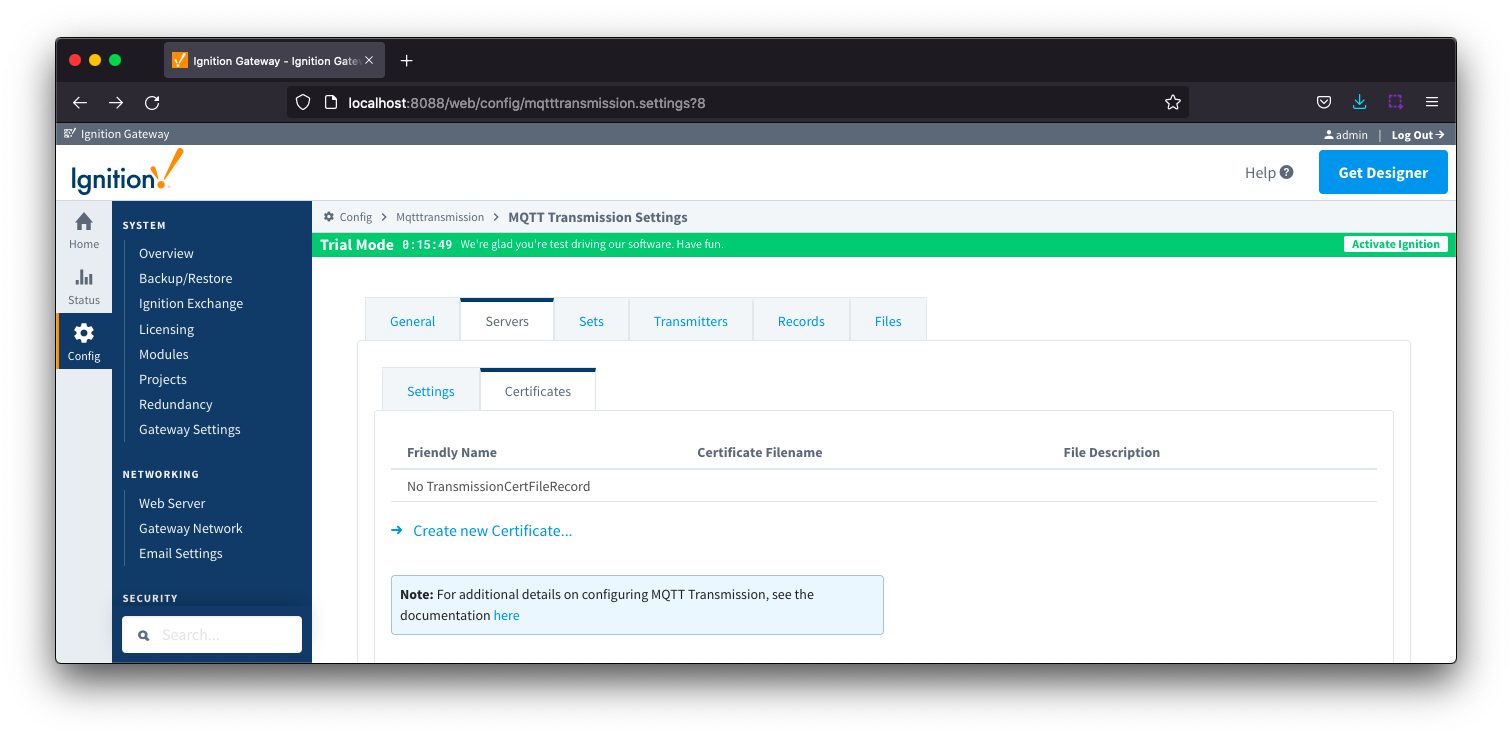
| Anchor |
|---|
| ServerCertificatesMain |
|---|
| ServerCertificatesMain |
|---|
|
Server Certificates - Main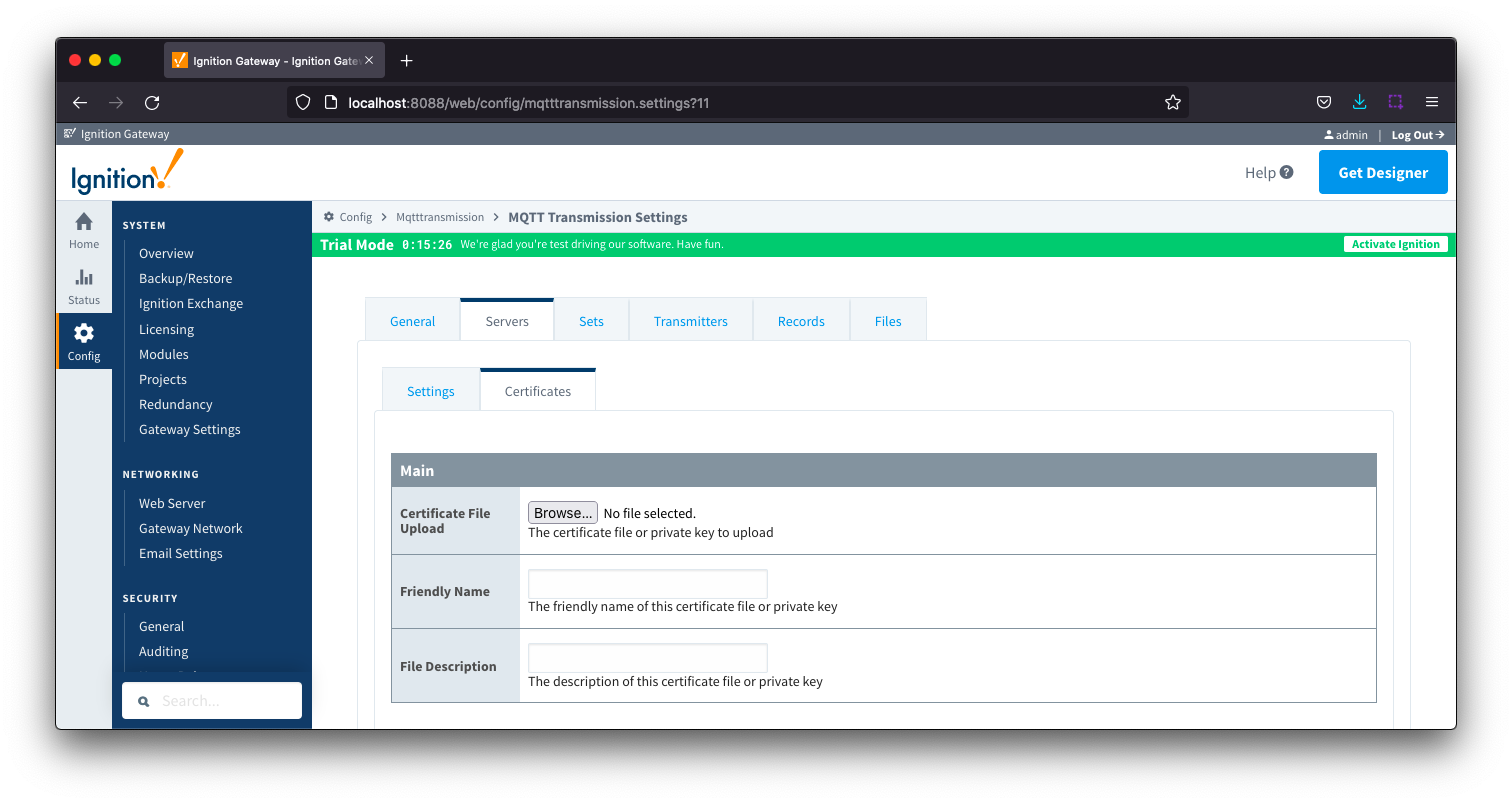
- Certificate File Upload
- Browse to the certificate file or private key to upload.
- Friendly Name
- The friendly name of the certificate file or private key.
- File Description
- The description of the certificate file or private key.
...
The Sets tab contains a single Main section.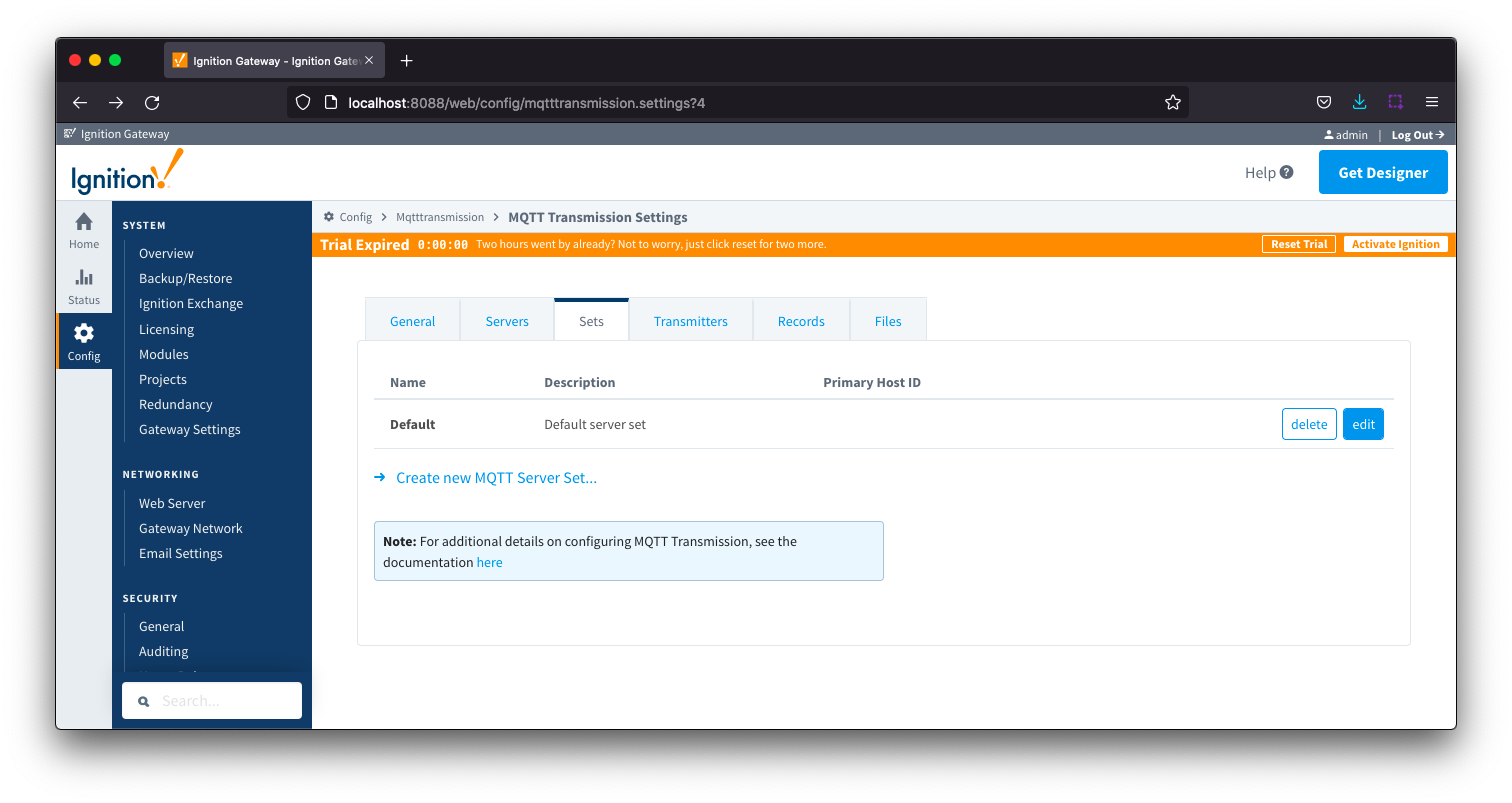
Sets - Main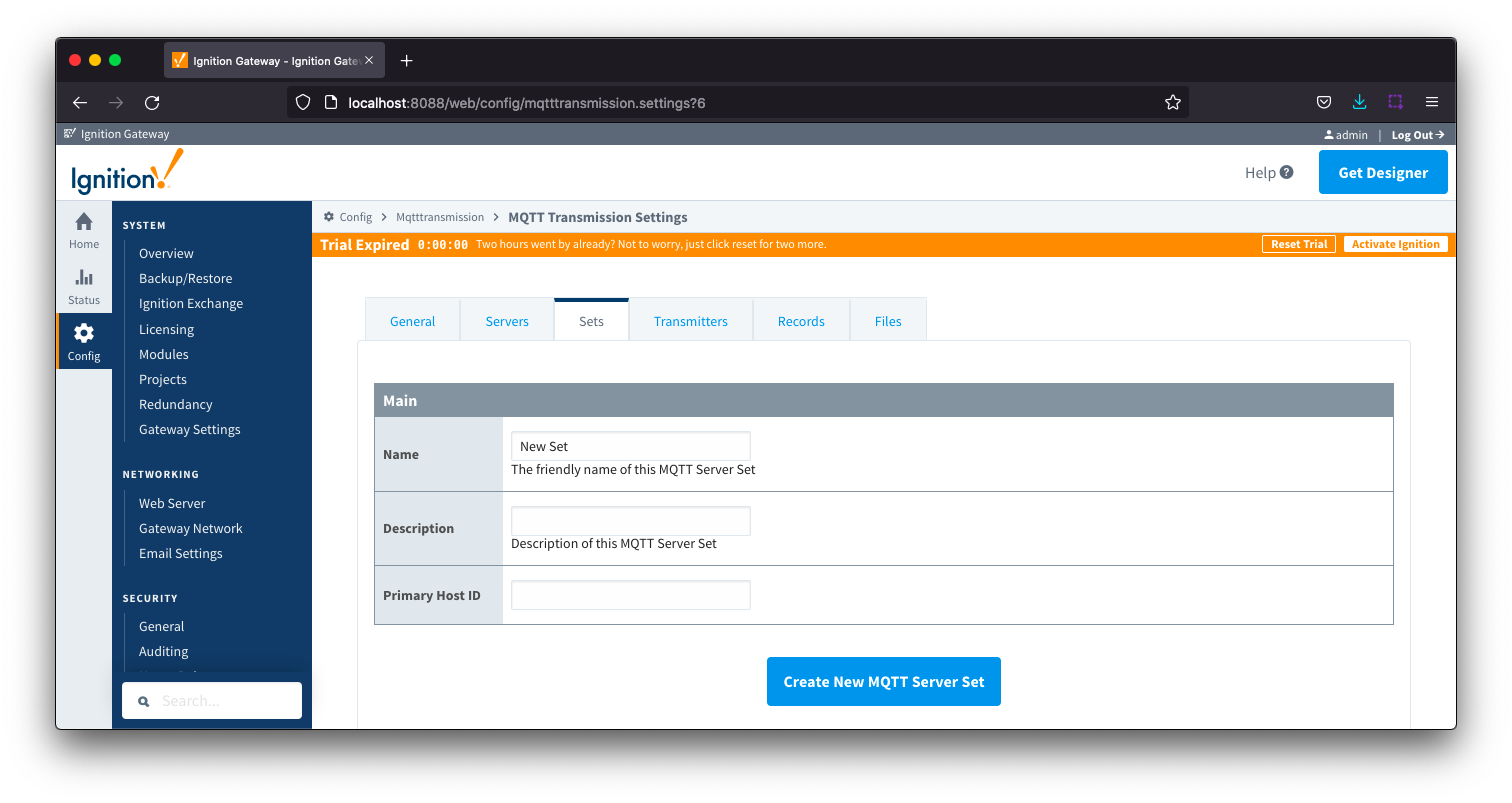
- Name
- This is the friendly name of the set used to easily identify it.
- Description
- This is a friendly description of the set.
- Primary Host ID
- The primary host ID to use for 'state' notifications. These notifications are used to notify MQTT Transmission if the primary backend application loses connection with the MQTT Server, meaning it has gone 'offline'. If MQTT Transmission is notified that the primary backend application has gone 'offline', it will close it's client connection with the MQTT server and walk to the next MQTT server defined in the set. If the primary host ID is not set, MQTT Transmission will not subscribe on the notification topics and not receive any 'state' notifications.
- This must contain only letters, numbers, or any of the following special characters: . $ % @ ! - _ ^ *
...
The configuration sections available are Tag Settings, Command Settings, History Settings, Sparkplug Settings and Advanced Settings.
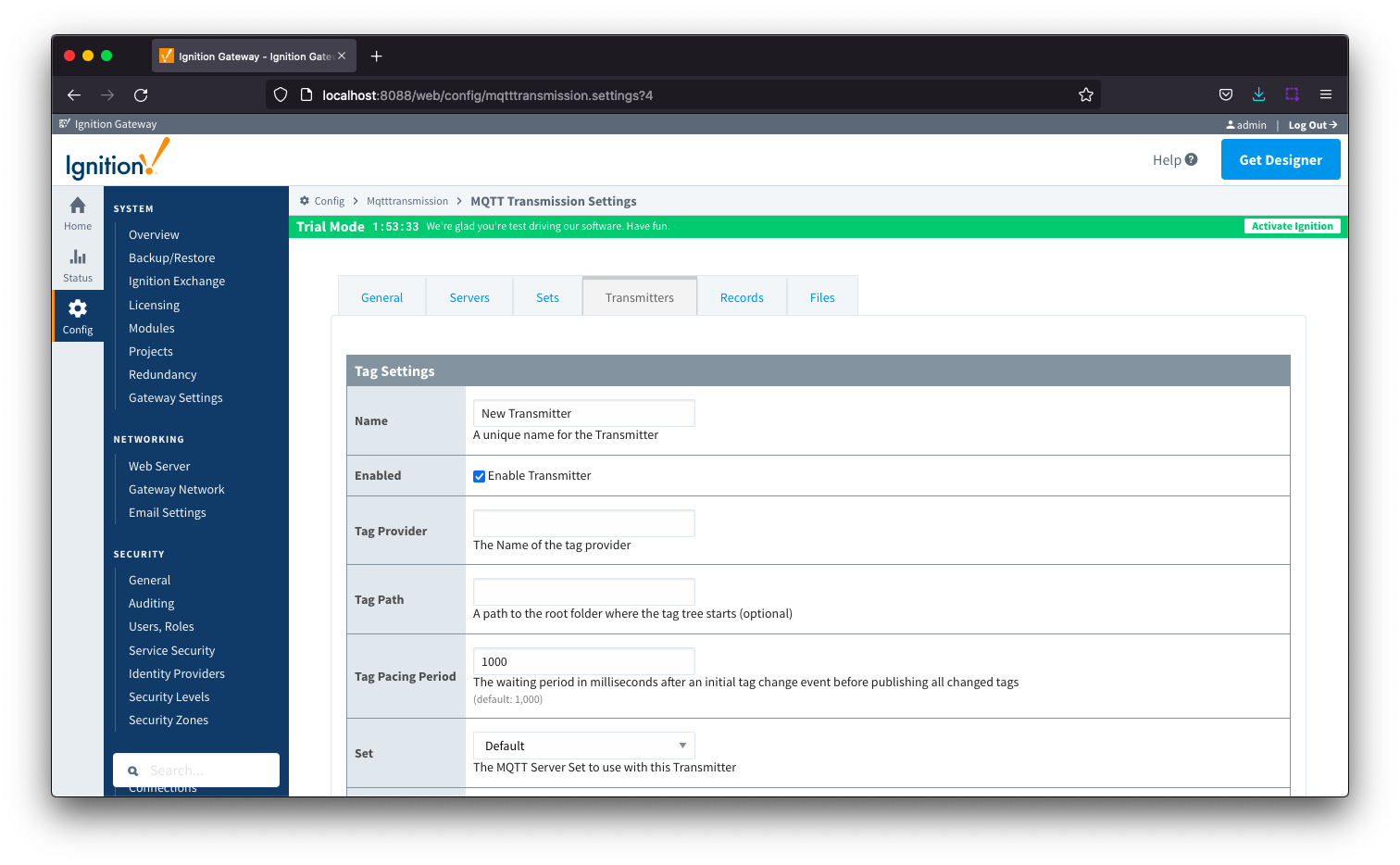
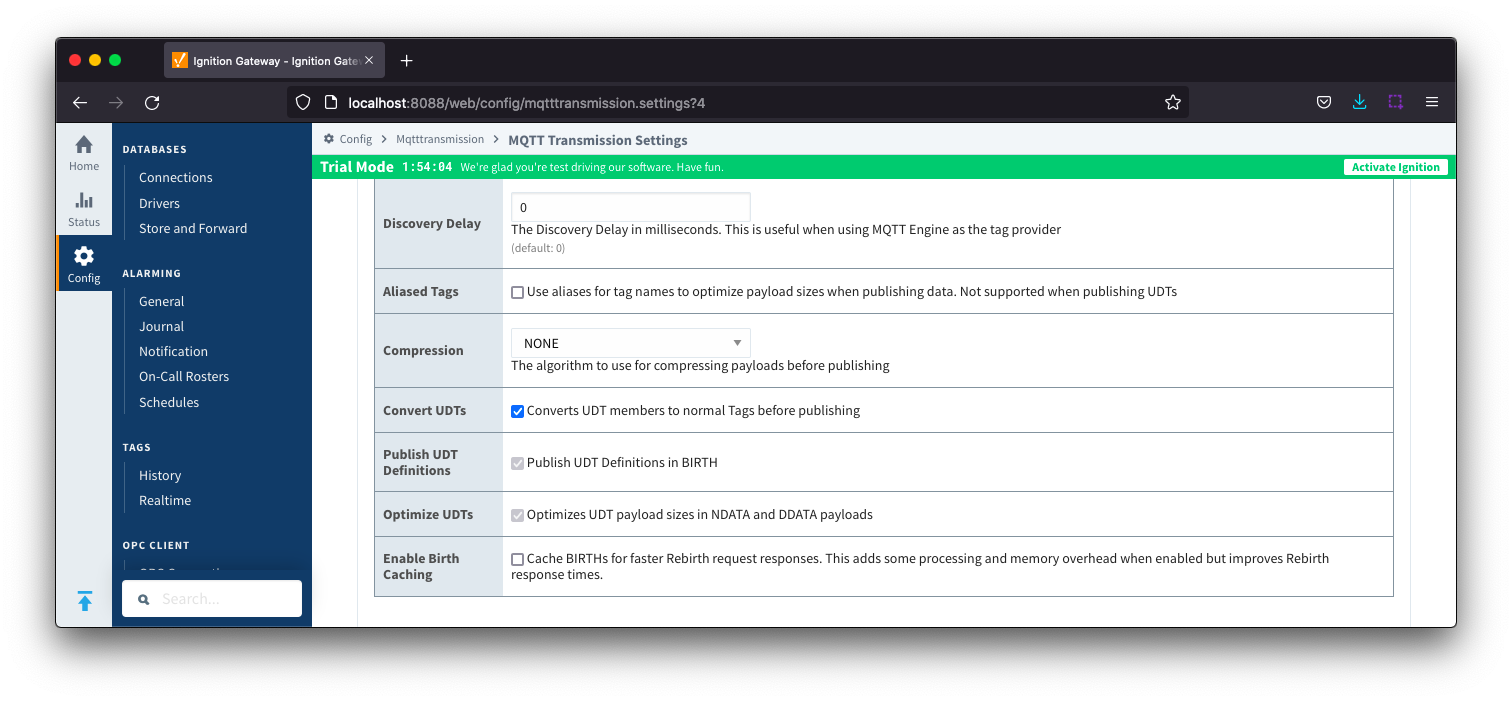
- Name
- Unique name for the Transmitter
- Enabled
- Checkbox to enable/disable the Transmitter. Selected by default.
- Tag Provider
- The name of the tag provider that Transmission will monitor. By default this is the Ignition 'default' provider.
- Tag Path
- Optional path to the root folder where the tag tree starts
- Tag Pacing Period
- The buffer period for outgoing Transmission messages in milliseconds. The default is 1000ms. This means when a tag change event is detected 1000ms will elapse before an MQTT message is sent. This allows additional tag change events to be buffered and put into the message and in turn reduce the number of generated MQTT messages.
- Set
- The Set that the default MQTT Transmission client will connect to.
- Discovery Delay
- An optional startup delay, in milliseconds, to wait before scanning for Tags to monitor. This is useful when Tags are dynamically created on initial startup, as is the case when using the MQTT Engine module.
- Aliased Tags
- Checkbox to enable/disable using aliases for tag names when published data messages as tag values change in order to optimize payload size when publishing data. Not selected by default.
- Compression
- The algorithm to use to compress payloads before they are published to the MQTT Server. If 'NONE' is selected then compression is disabled.
- Convert UDTs
- Checkbox to enable/disable converting UDT members to normal Tags before publishing. If enabled the Tags representing the UDT member will retain their member path prefixed by the UDT Instance name. Selected by default.
- Publish UDT Definitions
- Checkbox to enable/disable publishing UDT Definitions in BIRTH. Selected by default and not editable.
- Optimize UDTs
- Checkbox to enable/disable optimizing UDT payload sizes in NDATA and DDATA payloads. Selected by default and not editable.
- Enable Birth Caching
- Checkbox to enable/disable caching birth requests for faster rebirth request response. Not selected by default.
| Anchor |
|---|
| TransmittersCommandSettings |
|---|
| TransmittersCommandSettings |
|---|
|
Transmitters - Command Settings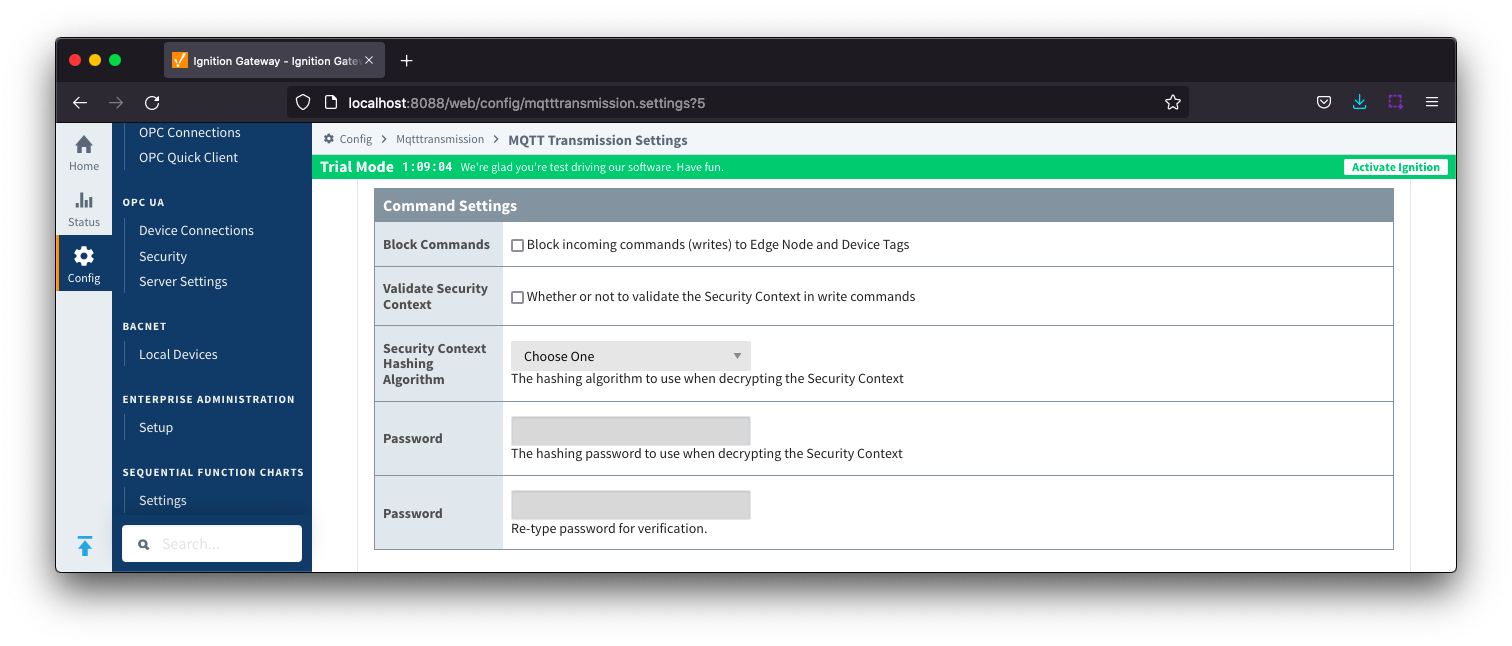 Image ModifiedBlock Commands
Image ModifiedBlock Commands- Checkbox to enable/disable the ability to block commands and tag writes received as messages from the MQTT server. Not selected by default.
- Validate Security Context
- Checkbox to enable/disable the ability to validate the Security Context in write commands. Not selected by default.
- Security Context Hashing Algorithm
- The hashing algorithm to use when decrypting the Security Context. Available if "Validate Security Context" is enabled.
- Password
- The hashing password to use when decrypting the Security Context. Available if "Validate Security Context" is enabled.
| Anchor |
|---|
| TransmittersHistorySettings |
|---|
| TransmittersHistorySettings |
|---|
|
Transmitters - History Settings Note: Store and Forward does not guarantee all data is stored and forwarded. There are some edge cases that are not currently handled with regard to data loss in the event of connection failures related to MQTT keep alive timeouts. This window of potential missed data can be reduced by decreasing MQTT Transmission and MQTT Engine configurable keep alive timeouts.
Note: Store and Forward does not guarantee all data is stored and forwarded. There are some edge cases that are not currently handled with regard to data loss in the event of connection failures related to MQTT keep alive timeouts. This window of potential missed data can be reduced by decreasing MQTT Transmission and MQTT Engine configurable keep alive timeouts.
- History Store
- The MQTT Transmission History Store to use with the Default Transmitter.
- Enable History Storage by Default
- Checkbox to enable/disable Store and Forward for all tags. Selected by default. Adding a custom tag property named 'StoreAndForward' to individual tags can be used to override this default.
- In-Order History
- Checkbox to enable/disable the flush history in-order (synchronously) before live data resumes. Not selected by default.
| Anchor |
|---|
| TransmittersSparkplugSettings |
|---|
| TransmittersSparkplugSettings |
|---|
|
Transmitters - Sparkplug Settings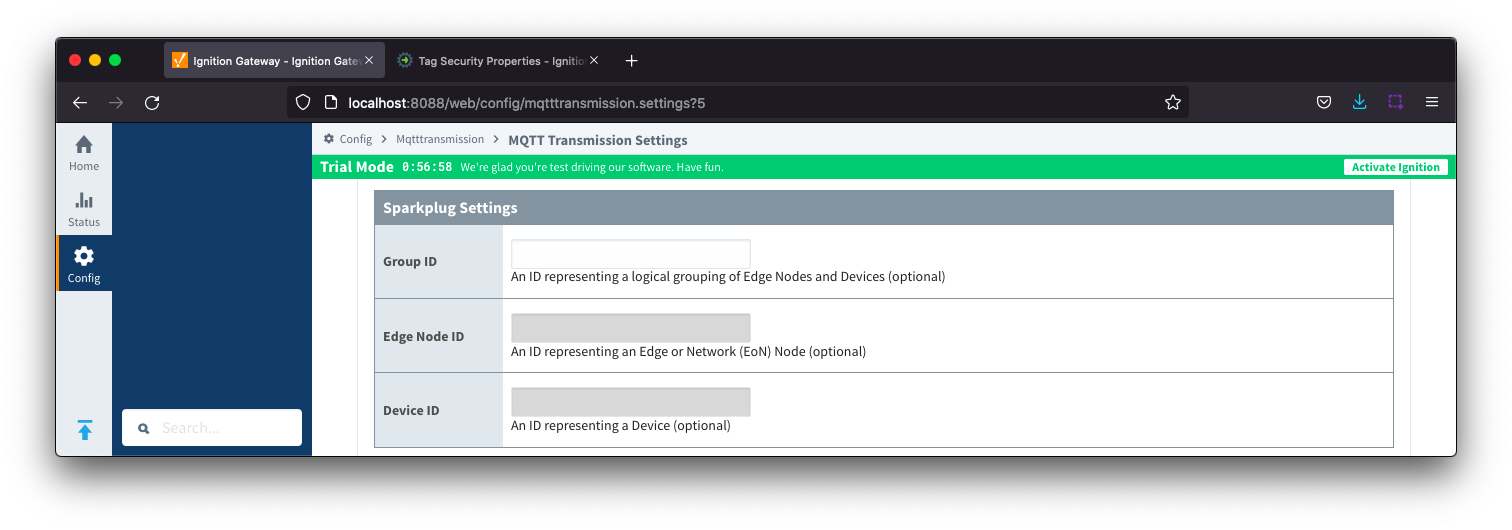
- Group ID
- An ID representing a logical grouping of MQTT Edge Of Network (EoN) Nodes and Devices into the infrastructure.
- Edge Node ID
- An ID that uniquely identifies the MQTT Edge Of Network (EoN) Node within the infrastructure.
- Device ID
- An optional ID that uniquely identifies a Device within the infrastructure.
Note that if a 'Device ID' is not specified, any folder within the folder specified by the Tag Path will be considered a device folder and any Tags within it will be published as device Tags.
| Anchor |
|---|
| TransmittersAdvancedSettings |
|---|
| TransmittersAdvancedSettings |
|---|
|
Transmitters - Advanced Settings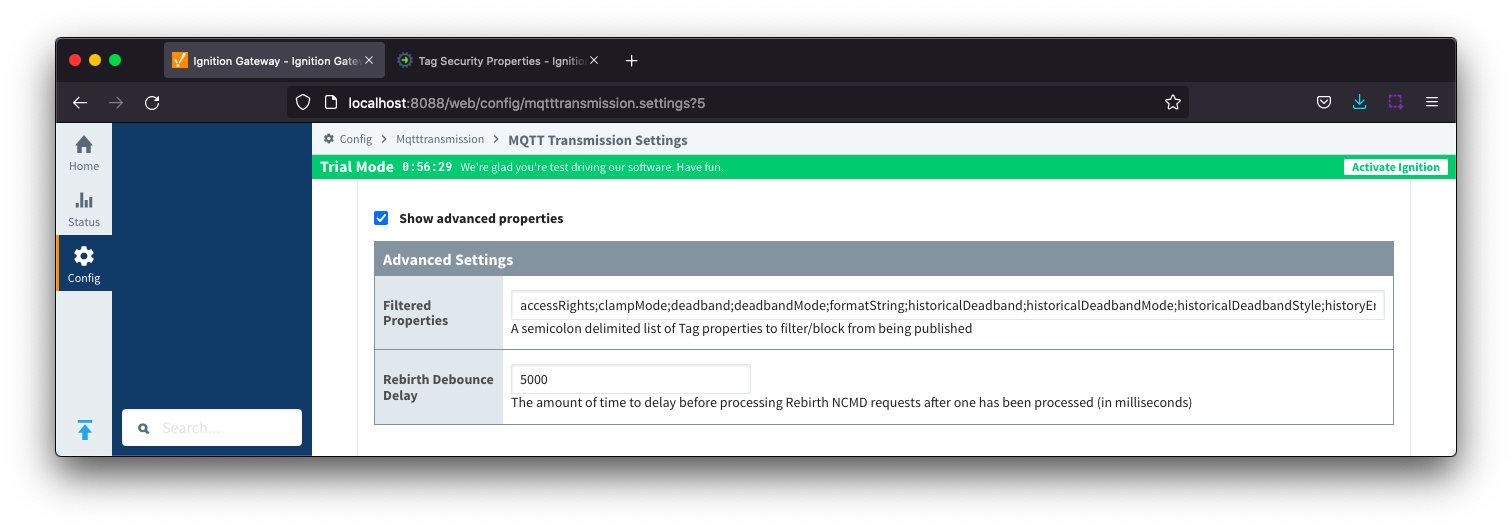 Image Modified
Image Modified- Filtered Properties
- A semicolon delimited list of Tag properties to filter/block from being published
- Rebirth Debounce Delay
- The amount of time, in milliseconds, to delay before processing Rebirth NCMD requests after pone has been processed. Default of 5000 milliseconds.
...
 The configuration sections available are Tag Settings and Sparkplug Settings.
The configuration sections available are Tag Settings and Sparkplug Settings.
| Anchor |
|---|
| RecordsTagSettings |
|---|
| RecordsTagSettings |
|---|
|
Records - Tag Settings- Tag Provider
- The name of the tag provider (i.e. default)
- Tag Folder Path
- The path to the tag folder under specified tag provider
- Record Type
| Anchor |
|---|
| RecordsSparkplugSettings |
|---|
| RecordsSparkplugSettings |
|---|
|
Records - Sparkplug Settings
- Group ID
- An ID representing a logical grouping of MQTT Edge of Network (EoN) Nodes and Devices into the infrastructure.
- Edge Node ID
- An ID that uniquely identifies the MQTT Edge of Network (EoN) Node within the infrastructure.
- Device ID
- An Optional ID that uniquely identifies a Device within the infrastructure.
...
The configuration sections available are Tag Settings, File Settings, Sparkplug Settings and Advanced Settings.
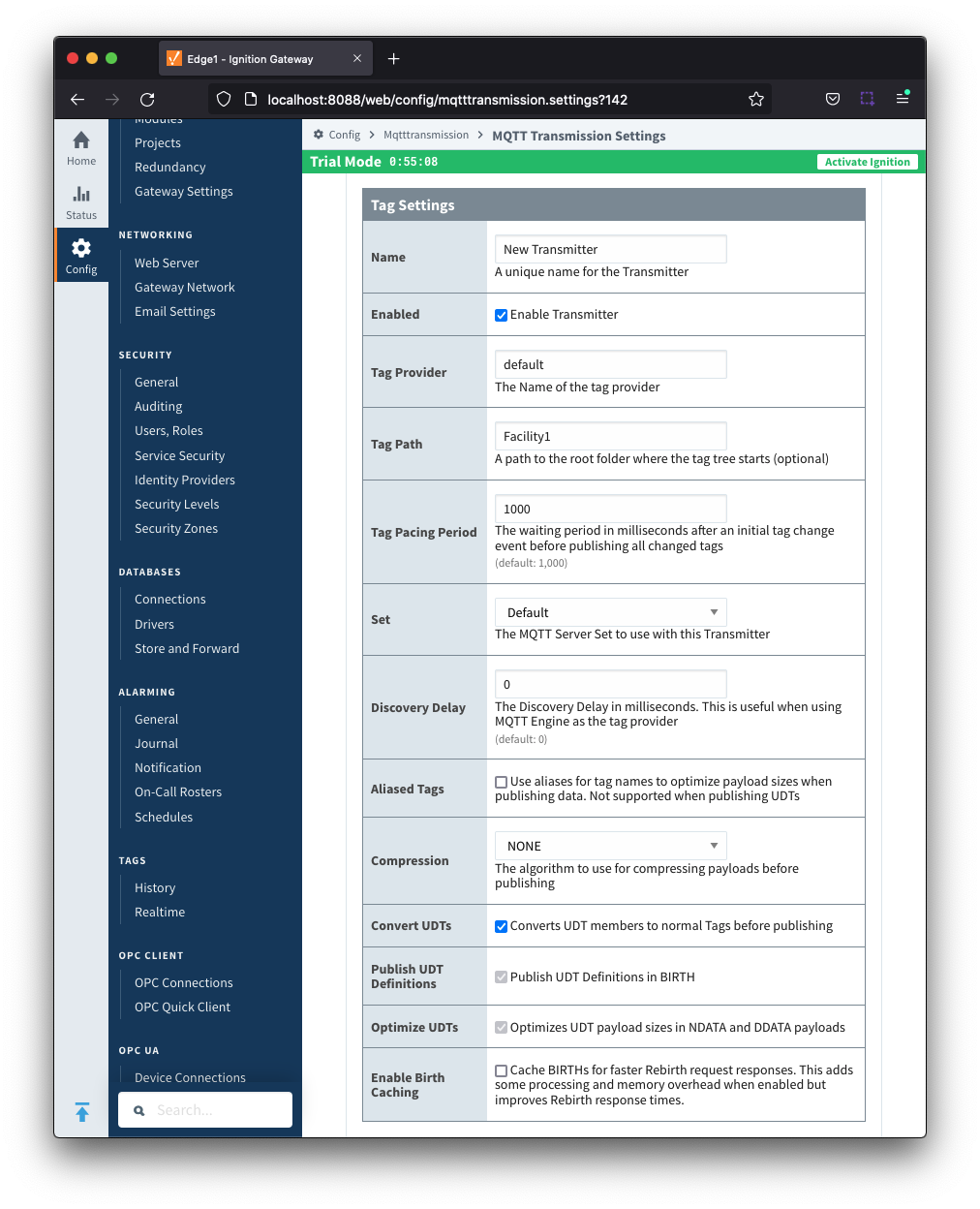
- Tag Provider
- The name of the tag provider (i.e. default)
- Tag Folder Path
- The path to the tag folder under specified tag provider
| Anchor |
|---|
| FilesFileSettings |
|---|
| FilesFileSettings |
|---|
|
Files - File Settings
- Enable Auto-Publish
- Checkbox to enable/disable auto publish of files. Not selected by default.
- File Scan Rate
- The rate, in seconds, to scan the files directory specified in the 'Publish Files Path' tag for files to publish. Default is 60 seconds.
| Anchor |
|---|
| FilesSparkplugSettings |
|---|
| FilesSparkplugSettings |
|---|
|
Files - Sparkplug Settings
- Group ID
- An ID representing a logical grouping of MQTT Edge of Network (EoN) Nodes and Devices into the infrastructure.
- Edge Node ID
- An ID that uniquely identifies the MQTT Edge of Network (EoN) Node within the infrastructure.
- Device ID
- An Optional ID that uniquely identifies a Device within the infrastructure.
| Anchor |
|---|
| FilesAdvancedSettings |
|---|
| FilesAdvancedSettings |
|---|
|
Files - Advanced Settings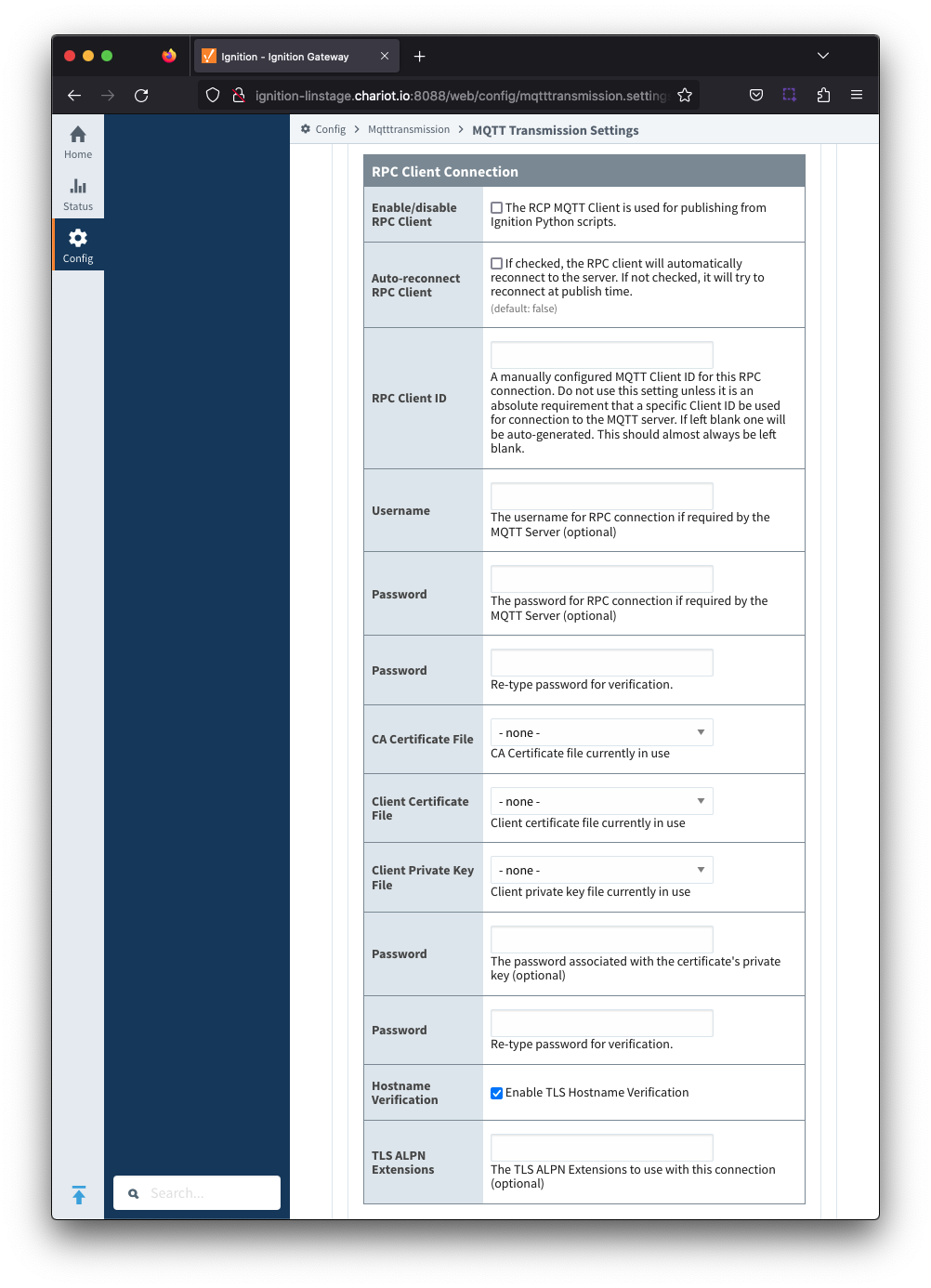
- Message Size
- Number of bytes to transfer in one message, Default 1000 bytes.
- Message Pacing Period
- Message Pacing Period is milliseconds. Default 1000 milliseconds.
- Message ACK Timeout
- Message acknowledgement timeout in seconds. Default 10 seconds.
- Number Retries
- Number of retries to publish a file or chunk or a file
- Submit Basic File Attributes
- Checkbox to enable/disable the basic file attributes to be included in the metrics. Not selected by default.
...
The History tab contains a single Main section.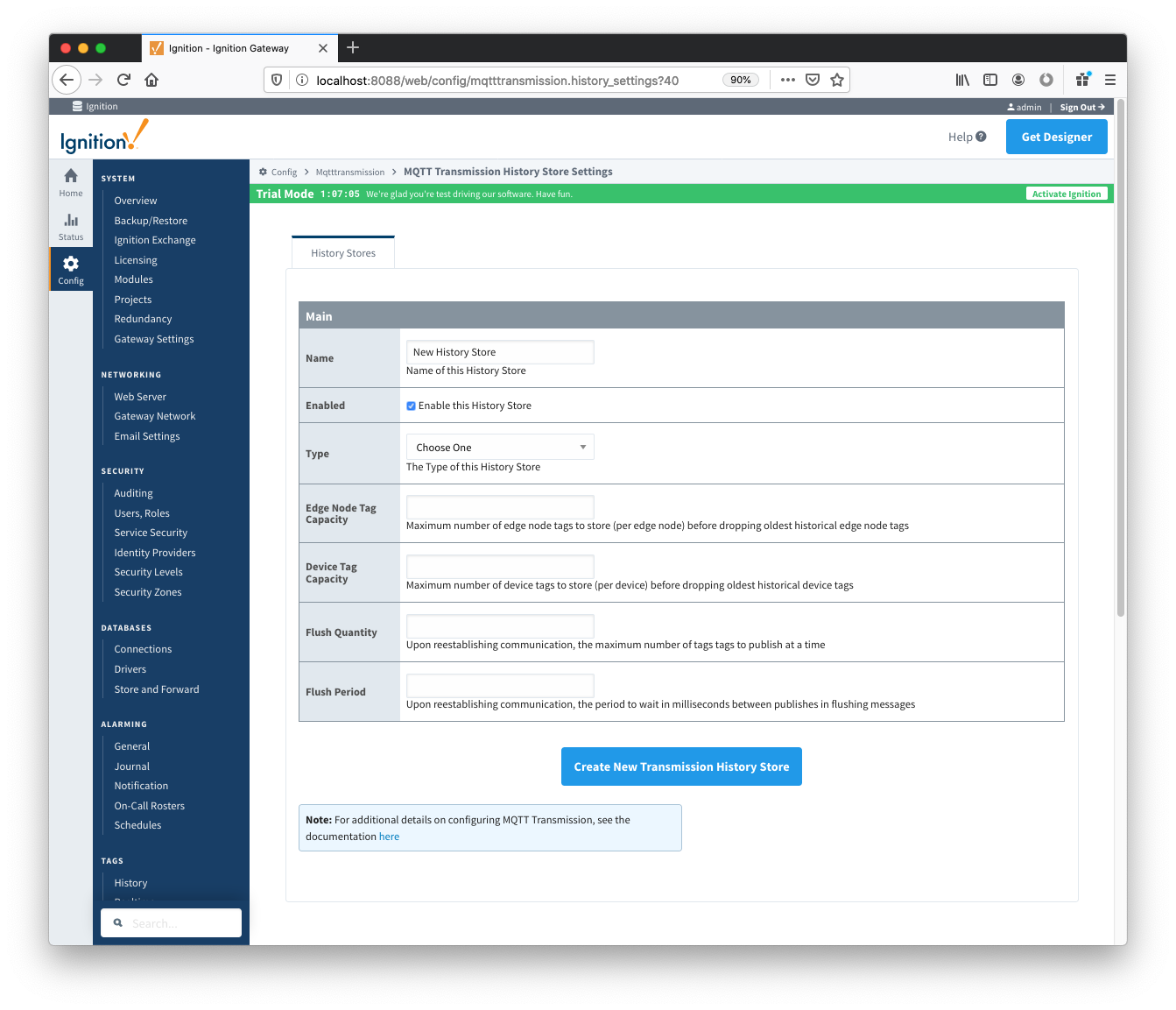
History - Main
- Name
- The name of the History Store.
- Enabled
- Checkbox to enable/disable the History Store. Selected by default.
- Type
- The type of History Store.
- Edge Node Tag Capacity
- The maximum number of edge node tags to store (per edge node) before dropping the oldest currently stored tag value.
- Device Tag Capacity
- The maximum number of device tags to store (per device) before dropping the oldest currently stored tag value.
- Flush Quantity
- The maximum number of tags to publish in a single message upon reestablishing communication.
- Flush Period
- The period to wait in milliseconds between publishes when flushing messages upon reestablishing communication.
...
![]()
![]()
![]()
![]()
![]()
![]()
![]()
![]()
![]()